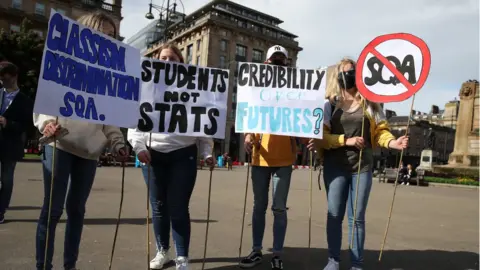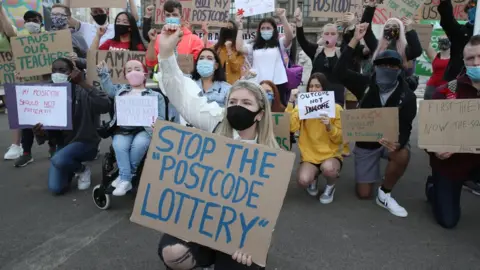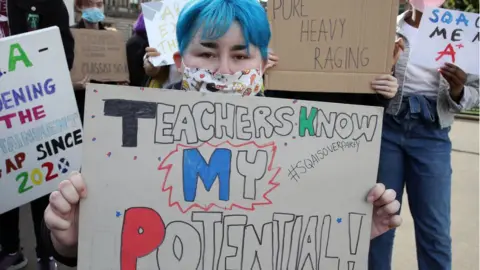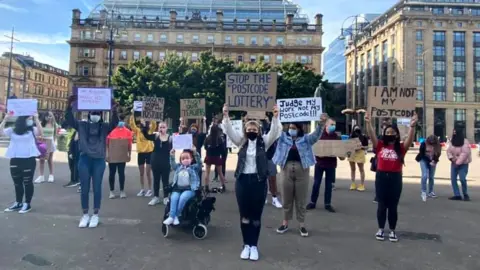Coronavirus in Scotland: School pupils protest over SQA exam results
About 100 school pupils have joined a demonstration in Glasgow in protest at the way exam results were graded.
They gathered at George Square to protest about how the Scottish Qualifications Authority (SQA) moderated grades.
In Midlothian, pupils also protested outside the country's exam body headquarters in Dalkeith.
The protests come after thousands of students received worse results than they were expecting on Tuesday.
All exams were cancelled this year due to the ongoing coronavirus pandemic. Prelim exams and teacher estimates were used to grade pupils but the SQA moderated some results.
 PA Media
PA MediaThe SQA lowered about 125,000 estimated grades - and many students believe they were penalised during the moderation process because their schools have historically not performed as well as others.
The pass rate of pupils in the most deprived data zones was reduced by 15.2% from teacher estimates after the exam board's moderation.
In contrast, the pass rate for pupils from the most affluent backgrounds dropped by 6.9%.
'We will not take this'
Erin Bleakley, 17, from Carntyne, organised the Glasgow protest after she saw her maths grade go from an A in her prelim to a D from the SQA on the final results.
She said she hoped the protest would highlight how pupils living in areas of high deprivation were disproportionately affected by marks being downgraded.
 PA Media
PA MediaErin told BBC Good Morning Scotland: "When my exams came in the other day, I was really, really disappointed to see the results I got in my prelims had no way came over into my exams.
"I just hope that we are heard and that our voices are heard today. We will not stand back and take this. We are not determined by our postcodes".
'We are coming together'
More than 35,000 people have signed an online petition to re-evaluate the exam results, not based on what the petition called "a classist marking scheme".
Sarah McLaughlan, 18, from Edinburgh, was behind the petition and organised the second demonstration outside the SQA headquarters in Dalkeith.
She told BBC Good Morning Scotland she believed that pupils should be treated as individuals.
 PA Media
PA Media"Putting a group of students together as a collective based on their school and where it is situated is just morally wrong, I think," Sarah said.
"The protests show we are coming together. We are willing to go out in public and actually voice our concerns.
"The more we do this, the more seriously we will be taken I'm hoping."
North Lanarkshire Council's convener of Education Frank McNally has called for an independent review into what he called "a shambolic mess".
He voiced his concerns on BBC Radio Scotland about whether or not the appeals process could handle the numbers of pupils who wanted their grades remarked.
Mr McNally claimed on Twitter that council data showed 2,900 Higher pupils - 46% of the total in the North Lanarkshire council area - had been downgraded by the SQA.
What do the SQA and Scottish government say?
First Minister Nicola Sturgeon was asked about the protests and the fairness of how the grades were calculated at Friday's daily press briefing.
She said: "If you're a young person sitting at home right now or in George Square in Glasgow and you have results that are below what your teacher thought you should get, you are going to - understandably - feel very aggrieved.
"And if you think that's because of the postcode you live in or the school you go to, that is going to be even more pronounced."
While urging eligible pupils to appeal against their grades, Ms Sturgeon said that students are "entitled to be angry and entitled to feel that this is not just".
"The government will listen carefully to that, but please don't lose sight of this next part of the process because this is the part of the process that's not a statistical model, this is the part of the process that looks at your individual circumstances," she said.
 Megan Douglas
Megan DouglasScotland's education secretary has rejected claims that bright pupils from deprived areas were unfairly penalised by the country's exam system.
Speaking to the BBC's Good Morning Scotland programme, Mr Swinney said it was always accepted that there would be "questions" about the grading system that was introduced when exams were cancelled due to the coronavirus pandemic.
But he said the pass rate for pupils in the most deprived areas was higher this year than it was last year, while the attainment gap between the wealthiest and poorest pupils had narrowed.
The SQA said the most disadvantaged pupils had achieved better results this year than in 2019, with the number of passes also above the average for the past four years.
A spokesman added: "At Grades A to C, the attainment gap between the most and least disadvantaged young people is also narrower this year for National 5, Higher and Advanced Higher than for last year or the average gap for the last four years."
